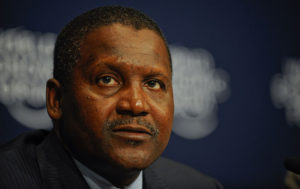Andrew Carnegie and John D. Rockefeller stand in history for their industrial success, which was complemented by philanthropy. Their contribution to the structural transformation of the United States is undeniable, and they offer lessons we need to learn in Africa to accelerate the pace of transformation.
African philanthropy is rooted in strong traditions of self-help, self-support, and volunteer institutions. Philanthropy is central to African culture where informal and formal giving is part of belonging to community and family life.
The rise of the continent’s billionaires is also the story of leveraging African resources to create wealth, and they are increasingly sharing the fruits of their labor with their communities. As these industrialists expand their reach through philanthropy, it is important to pause and reflect on how my generation can support these efforts to create wealth, not just alleviate poverty.
Africa’s prospects have never been brighter. The amount of wealth created in Africa shows that we have the human and financial resources to improve the lives of 1 billion citizens. Current market capitalization is above $1 trillion while Africa’s youth is getting better educated. Africa’s 50 richest people are worth a combined $100 billion, equal to about one-fifth of Nigeria’s GDP and 30 percent of South Africa’s.
African industrialization and African philanthropy are necessary to help us move away from small-scale projects helping the poor. What we need are industries that create jobs and philanthropy that makes large-scale investments in programs that will ensure a pipeline of healthy and capable workers.
One of Africa’s biggest industrialists is showing the way. Aliko Dangote, Africa’s richest man, has made industrialization a reality in parts of Africa where few wanted to invest. Dangote initially imported soft commodities and later shifted to manufacturing them in Nigeria. He eventually expanded into telecommunications, real estate, and steel manufacturing, turning the Dangote Group into the largest conglomerate in West Africa. Importantly, his charitable foundation is focusing on nutrition in Nigeria, his home country and Africa’s most populous nation. Proper nutrition and education can help Nigerians reach their full potential in contributing to the continent’s largest economy.
Focusing on nutrition is critical for Africa’s youth. Dangote’s business, as well as others investing in Africa, ought to ensure that malnutrition does not erode their investment by limiting the availability of qualified human resources. Stunted growth blunts intellect, which restrains productivity and limits progress.
This story doesn’t just illustrate the potential of philanthropy. It also demonstrates that how an industrialist gives away his money will be just as important as what he gives it to. In the 1990s, donors’ emphasis on HIV/AIDS in Africa resulted in chronic underfunding of less visible conditions such as nutrition, diarrhea, diabetes, and heart disease.
By focusing on nutrition and education, Dangote’s philanthropy has the power to lift a generation. His investment is not only changing the economic fabric of Africa, it is allowing those who do not benefit directly from working in his factories and buying his products to gradually take a role in Africa’s transformation. But even if Dangote increased his contribution to his foundation, he could not achieve this alone.
We need to make this the blueprint for African philanthropy. The standard U.S. philanthropic model—in which as much as 95 percent of funds are held back to maintain an endowment—leaves too much cash on the table. Doubling or tripling the investment to 10 or 15 percent of total funds would go a long way toward transforming industries to better redistribute wealth. In order to achieve this, Africa needs to reform its tax structure to cast a wider net around those able but unwilling to pay. Effective reform would create greater incentive to use philanthropy as a vehicle for Africa’s transformation. Egypt and South Africa have already moved in the right direction, according to The Rules to Give by Index, which compares incentives across countries. But there is room for progress across the continent, starting with more generous tax breaks for individual and corporate philanthropy.
We have a responsibility to solve social problems that hinder industrialization. Dangote is just 59 years old—far younger than Carnegie and Rockefeller were when they launched their philanthropic endeavors. Industrialization is driving Dangote’s philanthropic investment through his foundation, which has an endowment of over $1 billion. He is changing philanthropy to deliver impact where it matters most: in people’s pockets.
Africans want ambitious partners who are willing to take great risks for growing social value. African philanthropists are a step ahead of Carnegie and Rockefeller in a continent that needs industrialization to quell youth unemployment, modernize agriculture, and expand its internal market. We need more industrialists with a shared vision focused on the transformation of Africans and Africa.

